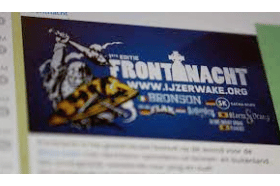Depress yourself with this story…
Authorities in Ieper, where Frontnacht will take place, have said that there are no legal grounds to ban the concert – likely in reference to Belgium’s Anti-Racism Law which prohibits hate speech.
“Of course, we won’t tolerate neo-Nazism or fascism in Ieper, so we’ll watch closely to ensure that nothing goes wrong”, City Alderman Diego Desmadryl told Antwerp-based Het Laatste Nieuws. “However, that’s not to say that if groups or musicians may have had links with such groups, they still have them today”, he continued. Desmadryl also noted that the city authorities had sought advice from the police and OCAD, a Belgian state counter-extremism agency, on the issue.
Frontnacht’s organisers claim there’s nothing “far-right extremist” or “neo-Nazi” about the festival, and have said online that critics have pulled their arguments “out of thin air”. On 23 July, Frontnacht started running an ad for their “identitarian music” event on Facebook.
But open source evidence shows that these criticisms are well grounded. Frontnacht’s headliners are well-known performers in the international far-right extremist music scene, with one band openly describing their repertoire as “manifestos” for their cause.
Even if their lyrics don’t fall foul of hate speech laws, experts warn that far-right extremist music can be a powerful recruitment and radicalisation tool.
The organisers of Frontnacht did not respond to multiple requests for comment from Bellingcat’s reporter.
“We want to present our message in a more contemporary way”
This year, Frontnacht will be held as part of the Flemish nationalist festival Ijzerwake.
Ijzerwake, named after the Ijzer or Yser river which flows through France and Belgium, broke away from the more mainstream Ijzerbedevaart, “Ijzer pilgrimage”, in 2003.
Ijzerbedevaart was first held in 1920, commemorating Flemish soldiers serving in the Belgian army who perished in the First World War. The pilgrimage has become a focal point of a growing yet diverse Flemish nationalist movement. Its adherents across the political spectrum have sought more autonomy for Flanders, union with the Netherlands, and an independent Flemish state.
In the Second World War, however, some elements of the Flemish nationalist movement collaborated with Nazi Germany. “Flemish nationalism was tarnished by World War II and collaboration,” said the historian Tom Junes, a scholar of nationalism and historical memory across Europe. “Nevertheless it was a broad movement as such and it had a ‘left-wing’ or rather progressive, emancipatory tendency as well”, Junes told Bellingcat.




